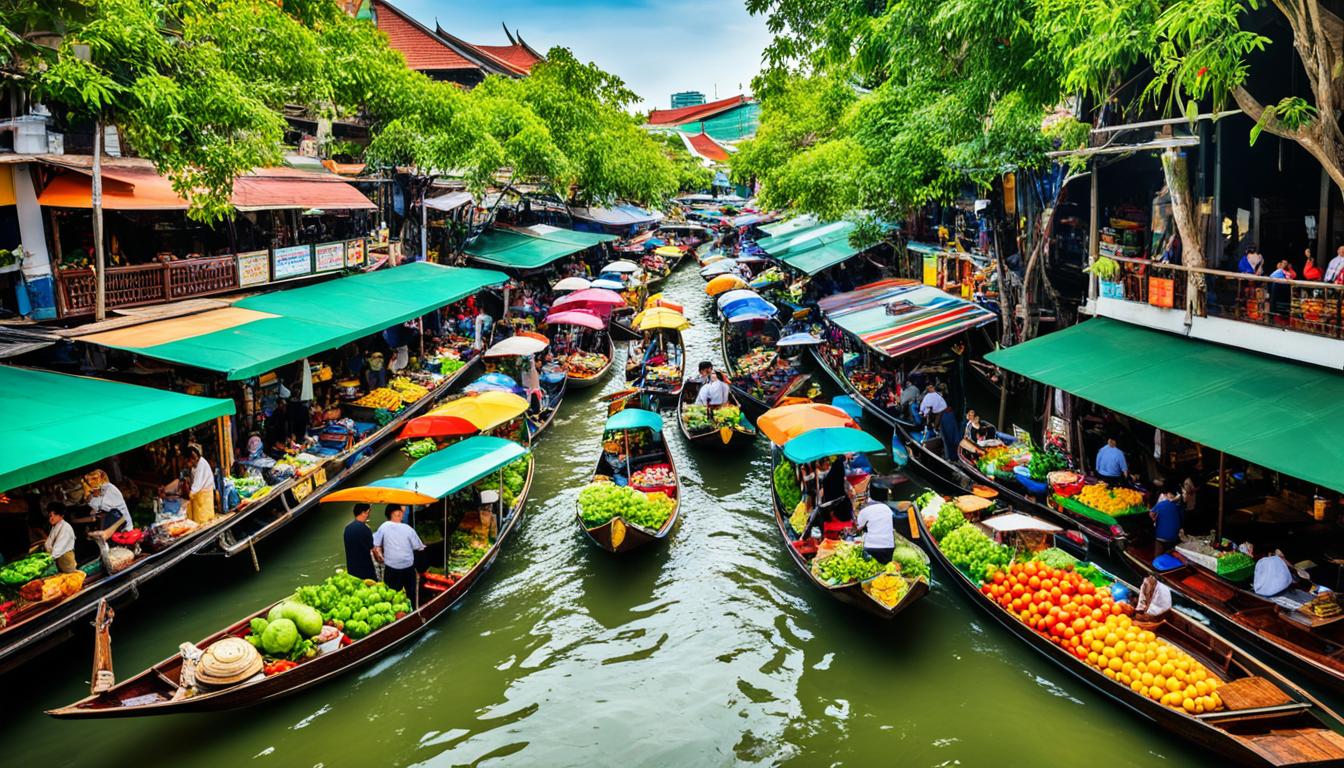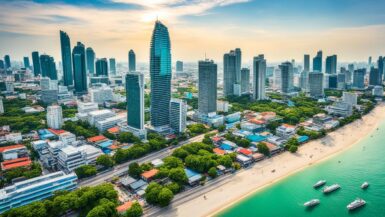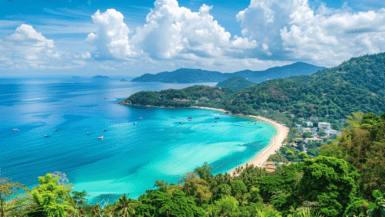Discover the charm of a floating market Bangkok adventure! Uncover unique finds, savor local foods, and immerse in a vibrant cultural experience.
Did you know that Thailand’s floating markets, a symphony of color and chaos, originally sprouted out of a time-honored necessity and have been thriving since the Ayutthaya Period in the 14th century? Today, they are an iconic must-visit floating market Bangkok attraction, drawing countless visitors who seek unique experiences at floating market Bangkok. From the extensive sprawl of the famous Damnoen Saduak to the relaxed evenings at Amphawa, there’s a floating market to suit every traveler’s fancy. Whether you’re a foodie, a photographer, or a culture enthusiast, floating markets are a captivating blend of all things quintessentially Thai and remain some of the best floating market Bangkok experiences you can indulge in.
Key Takeaways
- Explore the rich cultural floating market near Bangkok for a dive into history and tradition.
- Experience the largest and most famous floating market in Bangkok at Damnoen Saduak.
- Engage with the community and indulge in traditional Thai dishes and crafts at Amphawa on weekends.
- Discover intricate local products and savor the authenticity of floating market Bangkok cuisine.
- Take a short journey to uncover unique experiences at floating market Bangkok, from morning till night.
- Step off the beaten path to find hidden gems that offer more local and intimate market encounters.
- Enjoy a scenic and culturally rich shopping experience in the lesser-known but equally enchanting floating markets peppered near the city.
Discover the Vibrant Atmosphere of Damnoen Saduak Floating Market
Embark on a journey to the renowned Damnoen Saduak Floating Market, a gem located a mere 100 kilometers southwest of Bangkok. Known as one of the quintessential experiences for floating market Thailand aficionados, this bustling aquatic marketplace offers a tapestry of colors, flavors, and sounds. Join one of the many Bangkok floating market tours and let the vibrancy of local life enthral you as you float among vendors and artisans.
Boat Vendors and Local Delicacies
Mornings at Damnoen Saduak are punctuated by the gentle lapping of water against wooden canoes, as boat vendors display an array of local delicacies. From succulent exotic fruits to savory Thai snacks, the floating market is a feast for the senses. Taste the famed mango sticky rice or savor the tangy zest of boat noodles, making for a culinarily enlightening outing among the top things to do at floating market Bangkok.
Colorful Photographic Opportunities: Fruits and Handicrafts Afloat
As the sunlight pierces through the palm fronds, it illuminates a vibrant canvas ripe for photography enthusiasts. Capture scenes of tropical produce and handmade crafts adrift, their hues mirroring the lively spirit of Thailand’s culture.
Souvenir Shopping: Wooden Cone Hats and Thai Treats
For the souvenir hunter, Damnoen Saduak offers an array of keepsakes, from traditional wooden cone hats to intricate Thai treats. The market brims with artisanal charm, providing the perfect opportunity to take home a piece of Thai heritage. Whether you are looking to commune with local crafters or searching for the perfect memento, the floating market is a destination where culture and commerce flow in unison.
| Market Name | Location | Specialty | Best Time to Visit |
|---|---|---|---|
| Damnoen Saduak Floating Market | 100 km southwest of Bangkok | Fruits, Thai snacks, Souvenirs | Early morning |
| Amphawa Floating Market | 90 km southwest of Bangkok | Local cuisine, handicrafts | Afternoon to evening |
| Khlong Lat Mayom Floating Market | Outskirts of Bangkok | Lesser-known, peaceful atmosphere | Weekends |
| Taling Chan Floating Market | Bangkok | Fresh seafood | Early morning to midday |
Navigating Amphawa Floating Market Bangkok: A Culinary Journey
Often hailed as the best floating market in Bangkok, Amphawa Floating Market offers an enchanting blend of gustatory pleasures and traditional charm. Located a mere 50 kilometers southwest of Bangkok in Samut Songkhram Province, this destination is celebrated for its authentic local experience, particularly as it comes alive in the late afternoon with a mesmerizing display of food and culture.
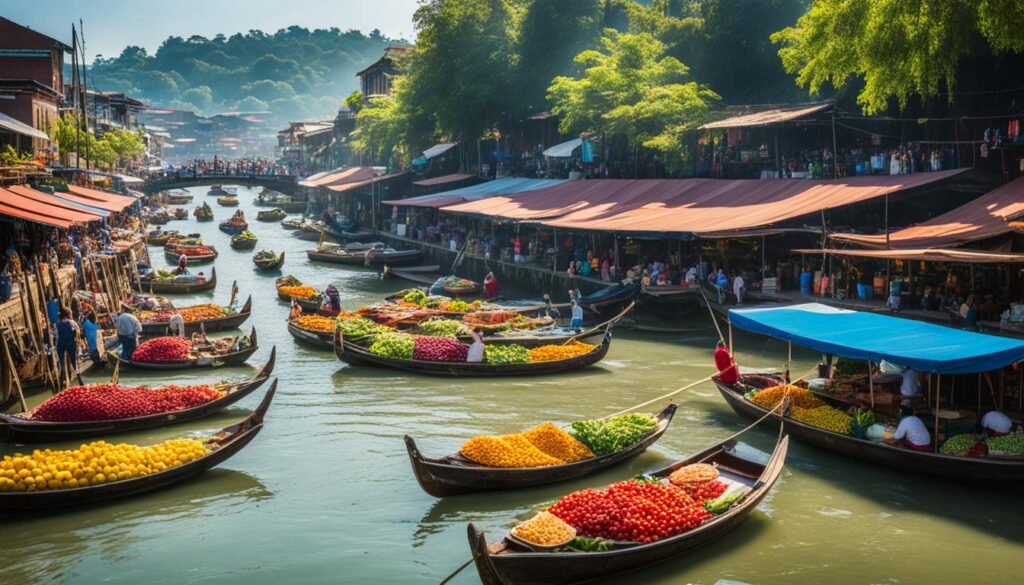
Tips for visiting the floating market Bangkok trend towards timing and transport. To truly seize the day, consider arriving early to partake in the unique tradition of giving alms to monks at 6:00 am. As the day progresses, immerse yourself in the Amphawa lifestyle. Accommodation options abound; whether you’re seeking a weekday retreat or a weekend adventure, prices range from 600 baht per night to 1200 baht per night for a more indulgent stay.
Whet your appetite with a variety of Thai food served from boats: succulent seafood like prawns and scallops, to classic dishes such as Pad Thai and grilled chicken. No visit is complete without sampling the coconut custard and dumplings that define Amphawa’s culinary journey. For the intrepid, a private boat tour meandering through the Mae Klong river is a must, at about 500 baht, or choose a budget-friendly longtail boat ride for around 50 baht per trip.
| Activity | Cost (baht) | Experience |
|---|---|---|
| Bicycle Rental | Free – 250/period | Explore the Amphawa scenery on two wheels with options spanning from a free half-hour ride to full-day adventures. |
| Firefly Watching Cruise | 60 – 600/night | Marvel at the twinkling beauty of fireflies along the Mae Klong river during a night cruise. |
| Thai Food Delicacies | Varies | Indulge in the richness of Thailand’s flavors with an extensive selection of local seafood and desserts. |
| Cultural & Local Lifestyle | – | Experience the traditional way of life, from market shopping to serene boat tours reflecting the true spirit of Amphawa. |
While charting your course to Amphawa’s floating market, accommodation options are plentiful and can enhance your stay significantly. With the market operating from Friday to Sunday (15:00–22:00), it serves well as a weekend getaway popular with locals and travelers alike. Rest assured, whether you’re exploring by bus, car, or mini-bus, Amphawa remains an accessible treasure trove, awaiting your discovery.
Amphawa Floating Market – where culinary adventures and serene views meet at the crossroads of Thai tradition.
To round off your visit, consider the pleasures of an evening boat trip to watch fireflies, or cycling through the quaint streets of Amphawa. Here, you’ll find the heart of Thai culture pulsating, with friendly faces and the offer of memorable times. Embrace these moments as you navigate one of the truly unique attractions near the dynamic city of Bangkok.
Unveiling the Magic of Maeklong Railway Market Near Bangkok
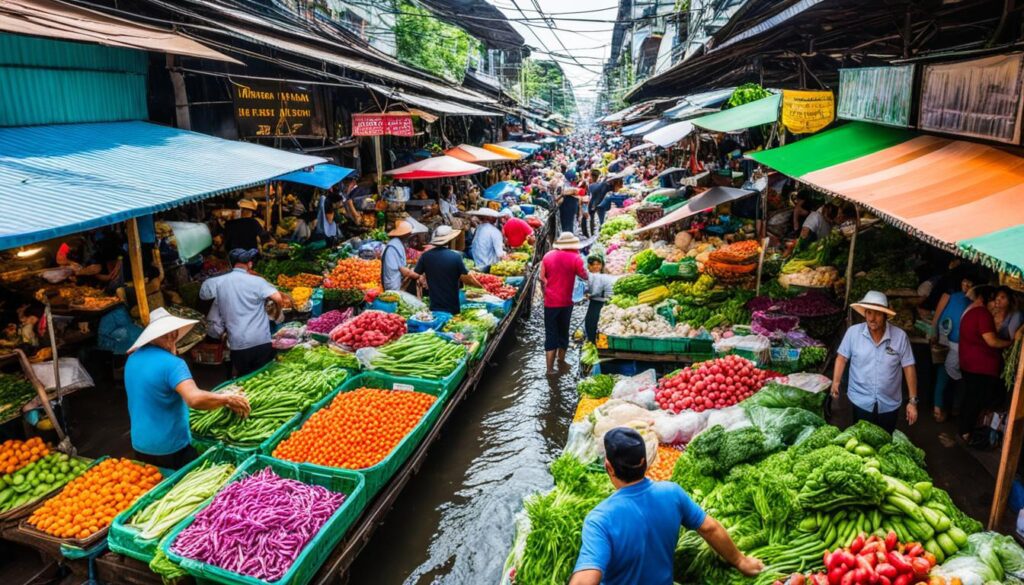
One of the most unique experiences at floating market Bangkok isn’t found on the water, but rather on the tracks of the Maeklong Railway Market. As a cornerstone of popular floating market Bangkok tours, this marketplace offers an extraordinary blend of shopping and spectacle, with trains gliding through tightly-packed vendor stalls. Navigating this space is both an adventure and a testament to the vivacious spirit of floating market Thailand culture.
Beyond the Rails: Shopping Amidst a Live Railway
Intriguingly, this bustling market operates on live train tracks. Vendors, attuned to the train’s schedule, swiftly move their wares and awnings allowing the trains to pass, sometimes with only inches to spare. This peculiar dance between commerce and transport creates a thrilling ambiance that both astonishes and delights visitors.
Local Gastronomy: From Dried Fruits to Khao Man Gai
Aside from the thrilling action, the market is also a center for delectable Thai foods. Tourists can explore rich flavors ranging from traditional dishes like Khao Man Gai, a seasoned chicken and rice plate, to an array of dried fruits that encapsulate Thailand’s tropical essence. In the sweltering heat, refreshing coconut treats provide a sweet respite, contributing to the overall sensory journey.
Cultural Insights: The Routine of a Train’s Horn and Shopkeepers’ Dance
The piercing sound of the train’s horn heralds a sequence that has become a daily ritual. Shopkeepers expertly retracting their goods represent a fascinating choreography that spotlights the resilience and adaptability of local Thai merchants. The market is not just a place for trade and meals—it’s a slice of life where tourists witness a time-honored tradition of adaptability and urgency that has charmed visitors worldwide.
Coupling trip to Maeklong with scenic train routes detailed by the Bangkok Post, one gains perspective on Thailand’s rail history including the impressive Khun Tan Tunnel and the evolution of rail stations like the expansive Krung Thep Apiwat Central Station. Whether one seeks the thrill of tight train clearances or the allure of fresh market cuisine, Maeklong Railway Market is an essential destination for those seeking truly unique experiences at floating market Bangkok.
A Complete Guide to Experiencing Floating Markets in Thailand
Exploring the top floating markets in Thailand is about delving into the heart of Thai culture where community, cuisine, and commerce flow together on the waterways. Whether you’re navigating to the lively stalls of Damnoen Saduak or seeking the tranquility of Tha Kha, each market offers a distinct vibe and palette of experiences. As you plan your trip around these cherished locales, understanding how to get to floating market Bangkok and finding suitable floating market Bangkok accommodation options will enhance your visit significantly.
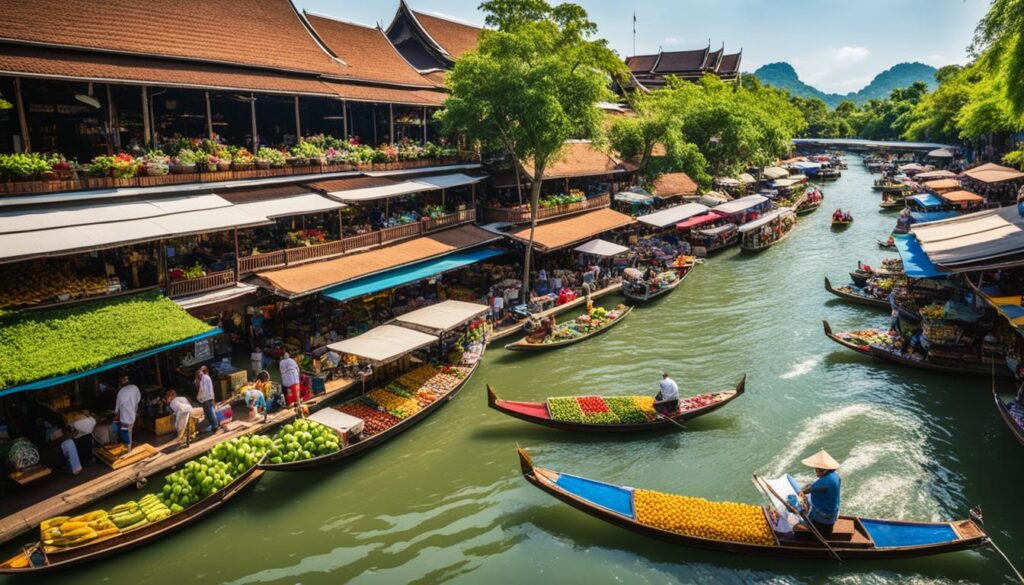
For instance, Amphawa Floating Market is a mere 60 miles from Bangkok, inviting visitors to its quaint charm and old wooden shops. With a tour lasting approximately 6 to 7 hours, you can savor a wide range of local dishes, from fresh seafood to sweet Thai desserts, all while supporting the small vendors and local economy. The less crowded Bang Noi and serene Tha Kha markets provide a traditional backdrop for experiencing authentic Thai street food prepared right on the boats.
Should your journey include the famed Mae Klong Railway Market, time your visit to witness the unique spectacle of a train zipping through the bustling market. To fully appreciate the Thai market scene, consider a guided tour that includes a visit to nearby temples or coconut sugar farms, deepening your connection to local life.
Essential tourist information like the boat capacity, which typically seats four excluding the pilot, or food prices ranging from 10 to 70 baht per order, provides practical insights for your visit. And, with floating markets generally operating in the early morning hours, an early start is advisable to catch the full range of activities.
When it comes to accessibility, taking Bus 78 from Bangkok’s Southern Bus Terminal will get you to Damnoen Saduak in about an hour and a half, immersing you in a scene described as touristy yet unmatched in vibrancy. In contrast, an evening visit to Amphawa’s floating market offers a glimpse into a more authentic slice of Thai lifestyle, especially on weekend nights.
No matter which market you choose to visit, prepare to be embraced by Thailand’s famed hospitality and to enjoy an outing that’s enjoyable for all ages. These markets aren’t just shopping destinations; they’re lively, family-friendly spaces where you can create lasting memories.
Conclusion
As we consider the cultural legacy of Thailand’s marketplaces, the emblematic floating market remains unsurpassed in its lure. While the Wat Sai Floating Market in Klong Bang Khunthian may have been the foremost celebrated floating market over 70 years ago, it’s undoubtedly Damnoen Saduak Floating Market in Ratchaburi province and Klong Amphawa Floating Market in Samut Songkhram that now captivate Thai travelers and international visitors alike. These markets rank as the top floating markets in Thailand, providing a picturesque tableau of Thai society and culture.
Originally, floating markets adhered to a schedule poised by natural rhythms and social traditions, commencing at the break of dawn and wrapping up before the swelter of midday took hold. Yet, with the Tourism Authority of Thailand’s strategic push to enhance appeal to tourists, the weekend shift not only altered the timetable but also expanded operations at bustling sites like Damnoen Saduak. However, this move engendered an influx of tourists, transforming certain areas into overly crowded hubs, challenging the infrastructure’s capacity to accommodate. In consequence, some visitors might now seek a more serene adventure at a floating market near Bangkok, where the original charm persists with lesser crowds.
On the flip side, with an overflow of so-called ‘fake’ floating markets, initiated merely for profit and lacking the historical essence of their authentic counterparts, have gradually faded away, as seen with the closure of a venture in Klong Prem Prachakorn. Yet, as Bangkok’s Or Tor Kor Market plans to manifest its take on a floating market in Klong Bang Sue, one wonders if the spirit of these biophilic bazaars can be truly replicated. For those who dream of experiencing the genuine article, exploring the famous floating markets in Bangkok will always be highlighted on their must-visit lists when they journey to Thailand. In the end, whether one seeks the expansive legacy of the past or the evolved present, Bangkok’s floating markets stand ready, welcoming all to partake in a timeless trade tableau.


